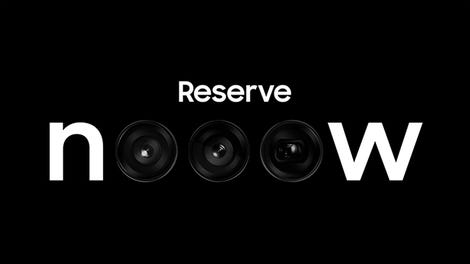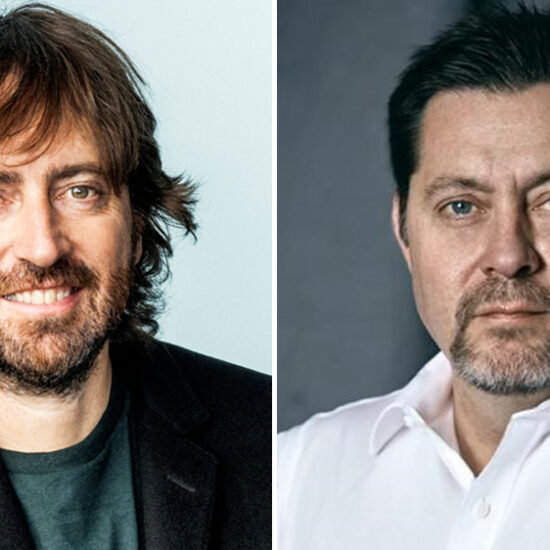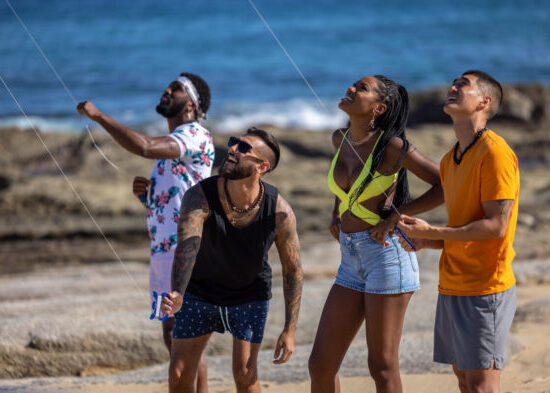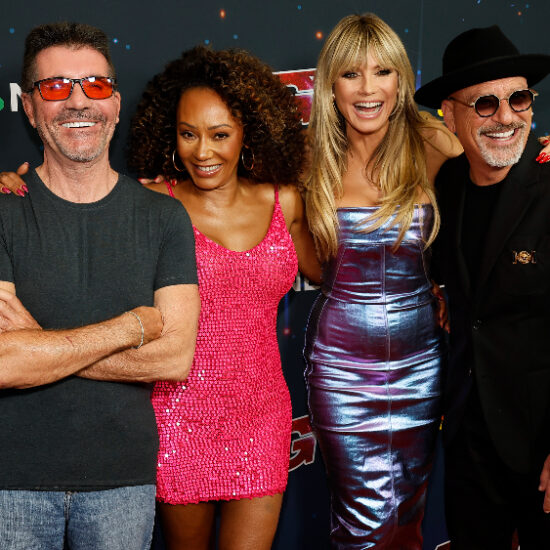
Roselyn Sánchez is proud to be Boricua. It’s evident from the moment she greets me on an early May afternoon at El Conquistador Resort in her native Puerto Rico. Within minutes, she tells me to take a taxi from the oceanfront resort in Fajardo—a dreamy escape built atop a hill, with lush tropical gardens, golden sandy beaches, and blue-green waters—to the colorful capital of San Juan, where she was born and raised.
Since moving to the continental U.S. nearly three decades ago, Sánchez has made a point to return to her homeland whenever possible to visit her family and friends, to host events (you might remember seeing her on the 2021 edition of Dick Clark’s New Year’s Rockin’ Eve With Ryan Seacrest), and in the last couple of years to shoot the Fox reboot of Fantasy Island. And through it all, she’s remained in awe of the resilience of the Puerto Rican people, who have been recovering from the COVID-19 pandemic and a string of natural disasters. “[There’s] a sense of community that those catastrophes created with people who had nothing in common; they had to unite to be able to survive,” Sánchez says. “They’re still smiling and loving the island even more.”
In a candid conversation, Sánchez spoke with The A.V. Club about the sophomore season of Fantasy Island (which premiered earlier this month and airs on Mondays), her starring role as Elena, the nuances of Latino representation, the responsibility she feels to tell stories about her community, and the balance of working with her husband, Eric Winter.
The A.V. Club: The first season of Fantasy Island ended on a high note with Elena, Ruby (Kiara Barnes), and Javier (John Gabriel Rodriquez) coming together to form the found family that is at the heart of this show week after week. Tell us where we’re at in this new season.
G/O Media may get a commission

Up to $100 credit
Samsung Reserve
Reserve the next gen Samsung device
All you need to do is sign up with your email and boom: credit for your preorder on a new Samsung device.
Roselyn Sánchez: Ruby gets more and more comfortable with her sexuality, and she’s going to discover incredible things and passion that she has never felt before. I think the relationship between Ruby and Elena is ever-growing, and it’s more and more cute and interesting, and they truly enjoy each other. They’re going to learn a lot, and they’re not always going to see eye-to-eye. There’s an episode specifically [where] there is a big conflict between them, but there’s nothing but love. And then with Javier, Elena is giving herself the opportunity to maybe fall in love and not be so strict about “My life is work and that’s it, and I’m gonna fulfill everybody’s fantasies but mine.” She opens up, and a crazy journey begins.
AVC: With this iteration of Fantasy Island, you’re continuing the Roarke legacy that Ricardo Montalbán left behind for a new generation of Latinos, and the writers have leaned into Elena’s heritage. Why do you think that attention to cultural authenticity is so important, particularly in today’s world?
RS: I think audiences are very clever and very smart, and if it’s not authentic, they don’t buy into it. I’m producing now, and before, it was acceptable to have a Mexican playing a Colombian. As long as you do the accent properly, we might believe it; we don’t care. But nowadays, because of the new change in paradigm and the new culture, it’s like, “No, let’s keep it authentic. If you want to go Mexican, there’s plenty of Mexicans who can do it. If you want to go Colombian, there’s plenty of Colombians.” So I think networks and producers can’t get away with those creative licenses anymore—or as much as before. Now, people want authenticity, and they want things to be organic. And what an incredible opportunity that they allowed Elena, who is clearly Latina, who has an accent, to not hide and just be who she is.

AVC: There are so many critically acclaimed Latino-led shows, such as One Day At A Time and Promised Land, that don’t seem to get enough viewers and are canceled before they are able to realize their potential. And I believe some of your past shows, including Devious Maids, fall into that category as well. Why do you think there’s a lack of supply of Latino-led projects when there’s clearly a demand for more diverse stories about this community?
RS: Max, I don’t know, and whoever has the answer to that is going to [win] the lottery. I think this is a question that networks, studios, showrunners, creators, and writers talk about all the time: “How do you tap into that Latino demographic? [How do you] crack the code and make the shows successful?” I don’t know what the missing ingredient is, because the talent is there. You have phenomenal actors across the board—Justina Machado doing One Day At A Time with Rita Moreno, and showrunners like Gloria Calderon Kellett. [There’s] massive talent, so what we’re putting out there is a good product.
Promised Land is a highly educated Latino family. It’s juicy. It’s Dynasty with Latinos. It was so incredibly effective when it came out in the ’70s, so why is it not clicking with the audience nowadays? We don’t know why. And hopefully, there is going to be one [that does click]. Even Devious Maids was a blessing. We did four seasons, and I truly believe it had a lot more longevity, but it was more of an inner fight between the studio and the network that didn’t get resolved. [There was] the topic of licensing and who gets the international sales, because it was performing really well. So I think Devious Maids was one of the few that was able to make it and still got canceled. So who knows?
AVC: With Devious Maids, Grand Hotel, and now Fantasy Island, you’ve been able to play rich, multi-layered characters that are becoming more and more common for Latinas in Hollywood. How have you navigated the issues of typecasting in an industry that consistently tries to put you in very specific boxes? How have you worked to expand people’s perceptions of what you can do as an actress?
RS: It’s the story of my life, and I just have to not get discouraged and count my blessings, to be honest with you. I’ve worked consistently; I’ve always played amazing Latino characters. Some of them will be viewed as stereotypical. Devious Maids got a lot of backlash and a lot of heat because everybody was like, “Why are these five actresses who are so accomplished playing maids?” [But] I’m not seeing it as a maid—I’m seeing it as a character, as a person. There’s nothing demeaning about a maid. And if it’s a role that has some meat, [where] I can do something special with it, I’m all about it. But I’ve been fighting that fight my whole life, because of the way I look, the way I speak, the way I carry myself. People have this perception, and they put you inside this box and they don’t see past that, so I have to fight.
I remember when I did Act Of Valor—that was stripped [down], no makeup, my hair was natural. And halfway through the movie, people didn’t know it was me, and everybody was so shocked. “You were so phenomenal! I didn’t know you could do that!” I was like, “What are you talking about? I’ve been doing that for 20-something years. You just haven’t seen the material, you know what I mean?” [Laughs.] I wasn’t always a pretty thing. But you just have to keep going and not get disappointed or allow those views and that perception to stop you.

AVC: When you think back to your biggest aspirations when you moved to the continental U.S. to find more work as an actor, how did that dream ultimately compare to your reality?
RS: Every single day, I think about, “When is the day that I get to go to New York and do Broadway?” I don’t regret anything, because I think my journey has been exquisite. I get paid to do what I love, so I can retire tomorrow and be like, “Shit, I did a lot! I feel accomplished.” But I don’t want to retire until I do musical theater. [Laughs.] I’ve done TV, I’ve done film, I have produced, I’m directing now, I did an album—I’ve done it all. But I haven’t done what I came to the States to do, which is seeing myself singing, acting, and dancing onstage.
AVC: Do you have a dream theater role that you would like to speak into existence?
RS: Chorus Line. I have an accent, so I was always like, “I have to [only] play a specific thing in musical theater.” So when In The Heights came out, I was obsessed. I’ve seen it three times. I even auditioned and was considered for the movie, and Daphne Rubin-Vega ended up getting it. But anyways, I saw In The Heights and I’m going, “Finally! There is something that is right for me.” West Side Story—I missed the boat for that one. [Laughs.] There are times my agent keeps saying, “You can do Chicago! We can push for you to do that.” But I’m never available, so I don’t know what the right thing is for me. I just heard that there’s a possibility that Chorus Line might come back with Antonio Banderas, so I’m just putting it out into the universe. Every day, I hope I get a shot.
AVC: Aside from acting, you and your husband, The Rookie’s Eric Winter, also have a popular podcast and recently signed a new producing deal that has allowed you to fast-track the development of HSI: Puerto Rico at CBS.
RS: I have an immense passion to produce and to direct, especially Latino content. I take it as a responsibility. I’ve been so lucky that it’s time to pay it forward, [especially] if I can do it in Puerto Rico and employ Puerto Ricans. This country is so unique in terms of our history. It’s a Commonwealth with an ever-evolving relationship with the States. Puerto Ricans are very divided when it comes to our political status. And as a place to shoot, it’s paradise. We have a little bit of everything. We have rainforests! So in terms of production value and history, we have so much to offer. So with HSI: Puerto Rico, there’s so many cop procedural franchises that do so well, [so] how is it possible that there’s not one here? That was the whole idea behind it.
AVC: Is being a multi-hyphenate—like Eva Longoria, Jennifer Lopez, and Cristela Alonzo—how you feel you are able to make the biggest impact in this industry as a proud Latina?
RS: Yes, it’s the only way … and that’s something that I wish I would have understood earlier. Even with directing, the first time I said “action,” I was like, “I cannot believe I waited so long to do this.” I was like a fish out of water. I was so incredibly uncomfortable, and everybody told me for years: “Ros, you need to direct. I’m telling you: You have the vision.” And I was like, “Uh…I don’t know. But I didn’t go to school for that. How do I communicate with a DP? I’m too insecure…” And once I did it, I was like, “Oh my God, Ros. Why? Why did you wait so long?” So I understand more than ever that, as a Latina, if I want to be able to bring content that I’m passionate about, that I like, that I understand and that is very much needed, it’s very much my responsibility.
AVC: Even though you’ve been able to reconnect with so many of your friends and family in Puerto Rico, you’ve also had to spend time away from your husband and two children, who live in Los Angeles. How have you worked to find that ever-changing work-life balance? Do you find the podcast is a good way for you to maintain that stability between your personal and professional lives?
RS: It’s a constant negotiation and a constant battle at times, I’m not going to lie to you. It’s the hardest part of this job. I married an actor. It’s an incredible blessing because we do the same thing, so he understands, more than anybody, the requirements and the logistical aspects of having to relocate and travel, and the crazy hours of work. But at the same time, this business is so unpredictable. We don’t know when we’re both going to be working at the same time like now. To be able to keep the relationship and the marriage intact and ever-growing, and now with kids added to the equation, it’s work within work. It’s not easy. My life would be complete if my kids were here with me. In four months, I’m only going to see them for two weeks. It’s quite devastating, to be honest with you.
My kid has a [junior tennis] tournament—she’s playing in 30 minutes. Tennis is a big passion for the family, and she’s doing so well, but [I’m] not there. And I know, at some point, she’s going to let me know, “You weren’t there,” so that’s going to be hard. But I try to explain to her at all times: “Mommy’s doing what she loves. Mommy’s working hard, so [that] you understand what it is to be an independent, fierce, hard-working woman. You have everything that you have because mom and dad work.” So I try to teach [our kids] the importance of what we do, but it’s not easy.
The podcast, funnily enough, is almost like a therapy session for me and Eric. [Laughs.] We fight, we laugh, and he tells me things that are bothering him right in front of everybody, and I’m like, “Wait! I didn’t know that was a problem!” [Laughs.] But we try to do it with humor and keep it classy and respectful, and we’re learning as we go.














